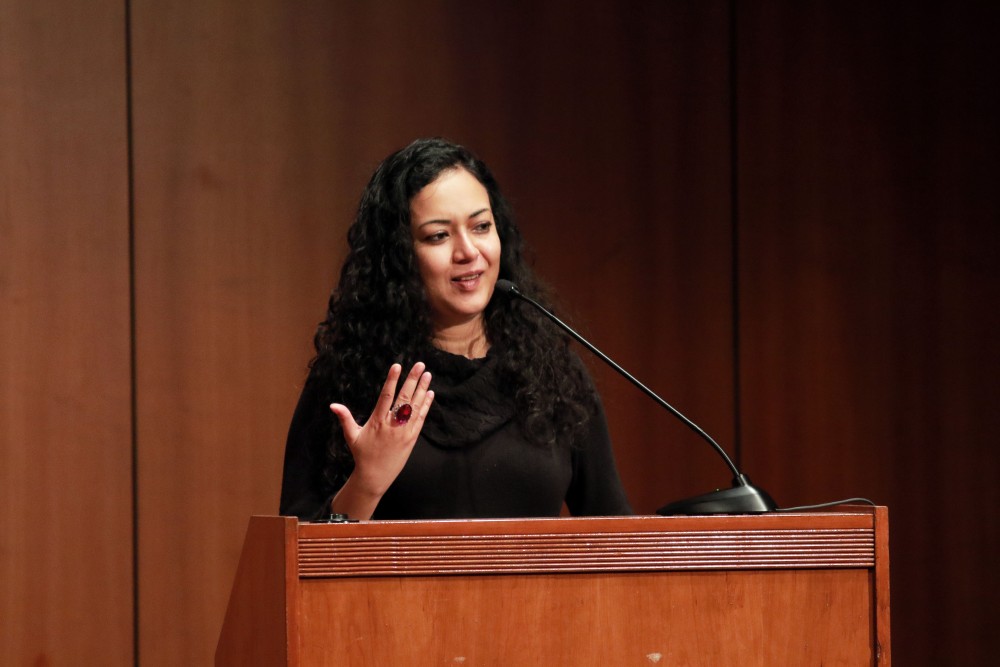Faculty reading weaves together diverse topics

GVL / Emily Frye Writer and Grand Valley State University visiting Professor, Oindrila Mukherjee reads for the Writers Series on Thurs. Jan. 28, 2016
Feb 1, 2016
Do microscopic cartoon cabbages, burning rickshaws and Facebook-stalking your ex have anything in common? Some may say no, but a recent faculty reading of diverse poetry and prose at Grand Valley State University’s Cook-DeWitt Center served as a reminder for students that writing can weave connections between many different people, objects and disciplines.
During the latest event in GVSU’s Writers Series on Jan. 29, assistant professor of writing, Glenn Shaheen ,read several poems from his collection titled “Predatory,” which won the 2010 Agnes Lynch Starrett Prize. Alongside Shaheen, Oindrila Mukherjee, assistant professor of writing, read prose excerpts from one of her novels.
Unlike many other events in GVSU’s ongoing Writers Series, Shaheen and Mukherjee alternated readings. Shaheen read a poem followed by an excerpt from Mukherjee in a back-and-forth that lasted for 22 total poems and excerpts.
Shaheen said that this was intentionally done to create a unique reading experience, one that braided together his and Mukherjee’s work.
Among the students in the audience was Charles Thompson, a junior economics major. Thompson said that the braided style of reading enhanced his experience.
“The themes and the scenes and the emotions really wove together extremely well. I don’t know, honestly, if I would have enjoyed it…separately as much as I did together,” Thompson said. “I think (Shaheen’s) poetry really brought out the themes of (Mukherjee’s) stories.”
Though their pieces were written independently, Shaheen and Mukherjee collaborated closely to choose readings that shared similar themes. Mukherjee, a native of India, said that she and Shaheen, who was born in Canada, saw many overlapping ideas of internationality.
“Ideas about globalization and capitalism…how it’s changing the world, and also immigration to America and people’s perception of America: I think these are some of the themes that jumped out at us as soon as we started comparing our work,” Mukherjee said. “(America) is a thing you view from a distance. It’s an idea. And I’ve been here for 14 years now, but I’m still very much an immigrant.”
Shaheen said poetry, creative fiction and fiction can help people to see different perspectives. The idea of perspective is an important reason for all students to appreciate writing, he said.
“(Perspectives in writing) allow you to look at the world through unique and unusual lenses,” Shaheen said. “The ability to look at situations or people, or objects, or other things in the world, just looking at them through different perspectives (and) think about them through different eyes. I think creative writing can really help that happen.”
Jazmine Gibbons, a psychology student, said that she especially enjoyed one of Shaheen’s poems that dealt with creating paranormal experiences through stimulation of the brain.
“I think it’s interesting how you can sort of get in a frenzy writing about the brain and how you perceive things, because everyone perceives things differently… and when you write about (something), it’s your own interpretation of a certain area, event or idea,” Gibbons said. “I think with writing, it’s like peeling off your layers. You just have to go deeper and deeper with it and not be scared of what ideas can come out from writing.”
Thompson also said the universality of writing and what it offers is what inspires him to come to readings like Shaheen and Mukherjee’s.
“Everyone writes to some extent, and I think everyone appreciates good, solid writing, and if you don’t, you should. You should force yourself to do it,” Thompson said. “I think any time you get to experience good art, in any form, it’s just good for you.”
Mukherjee said that the benefits of writing and reading extend far beyond the pages of a book.
“Why do people read fiction or poetry? I mean, not just writing majors read, right?” she said. “For entertainment, to learn about life, to connect with the characters and to just get insight into the universe and the human condition: that’s why people read literature, and you don’t have to be a writing major to love poetry, to love fiction.”
The next event in GVSU’s Writers Series will be a craft talk by Emmy Award-winning journalist and author Rubén Martinez on Feb. 24 at 4:30 p.m. in the Kirkhof Center. This event will be followed by a reading and book signing at 7 p.m. in the Cook-DeWitt Center.
A full calendar of events can be found online at www.gvsu.edu/writing.

























